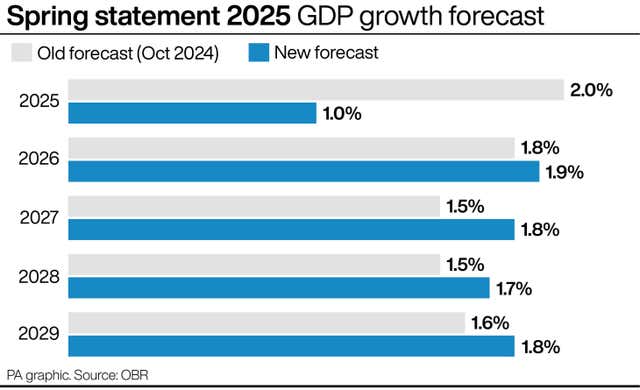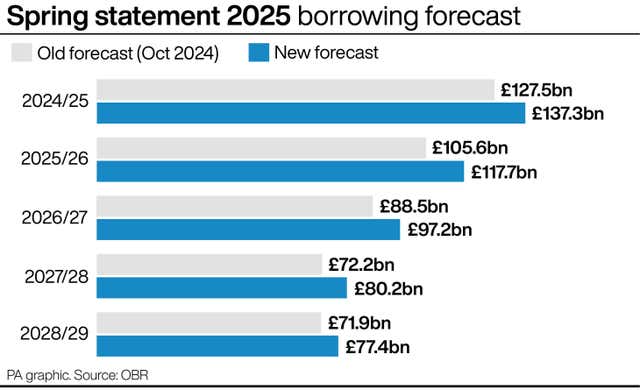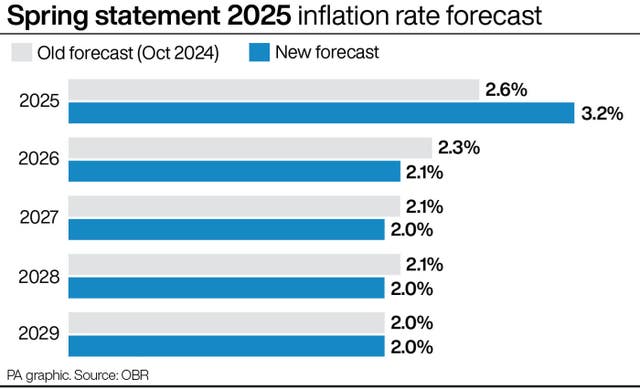
Nick Abbot 10pm - 2am
26 March 2025, 16:44

Chancellor Rachel Reeves was forced to set out further cuts in public spending after the Office for Budget Responsibility’s verdict.
Rachel Reeves blamed “increased global uncertainty” as the budget watchdog slashed its forecast for economic growth.
The Office for Budget Responsibility halved its forecast for growth in gross domestic product in 2025 from 2% to just 1%.
The watchdog’s assessment also indicated the Chancellor would have missed her goal of balancing the nation’s books without action.
Responding to the growth forecast, Ms Reeves said: “I am not satisfied with these numbers.
“That is why we on this side of the house are serious about taking the action needed to grow our economy. Backing the builders, not the blockers.”
Despite the dramatic downgrade in 2025, she said the OBR had upgraded its forecasts for subsequent years with GDP expected to increase by 1.9% in 2026, 1.8% in 2027, 1.7% in 2028 and 1.8% in 2029.

The watchdog also forecast that the Government’s planning reforms will increase GDP permanently by 0.2% in 2029/30, representing an additional £6.8 billion and pushing housebuilding to a “40-year high”.
Ms Reeves was forced to set out measures totalling around £14 billion, including a series of cuts, to ensure she met her “non-negotiable” goal of balancing day-to-day spending against tax receipts, rather than borrowing.
Ms Reeves told MPs: “The increased global uncertainty has had two consequences.
“First, on our public finances. And second, on the economy.”
Our March 2025 current budget deficit forecast.
Full forecast published after the Chancellor’s #SpringStatement speech pic.twitter.com/Cq0ihxdG23
— Office for Budget Responsibility (@OBR_UK) March 26, 2025
At her budget in October she set out plans which met that goal with £9.9 billion to spare in 2029/30.
But she said the updated forecast from the Office for Budget Responsibility indicated she would have missed the target by £4.1 billion without taking action to restore the £9.9 billion of headroom.
She confirmed a further squeeze on the welfare budget, building on cuts to the disability and incapacity bill set out earlier this month, with the package now expected to save £4.8 billion rather than the more than £5 billion in 2029/30 hoped for by ministers.
And she signalled cuts in Whitehall, with “voluntary exit schemes to reduce the size of the civil service”, taking advantage of technology to “make Government leaner, more productive and more efficient”, saving £3.5 billion by 2029/30.
Ms Reeves said that overall, day-to-day spending will be reduced by £6.1 billion by 2029/30 and it will now grow by an average of 1.2% a year above inflation, down from the 1.3% forecast at the time of the budget.
Government borrowing has been revised upwards in every year of the OBR forecast, reaching £137.3 billion in 2024/25, up from £127.5 billion which was forecast in October.
It then falls every year to reach £74 billion in 2029/30, up from £70.6 billion.

The OBR said the £14 billion of measures to restore Ms Reeves’s headroom came from “direct savings from welfare reforms and the reduction in day-to-day departmental spending” along with the “indirect boost” from the planning reforms.
The budget watchdog acknowledged a series of international factors at play, including the risk of a trade war triggered by US president Donald Trump’s tariff policies, but it also acknowledged a slump in business and consumer confidence since Ms Reeves’s first budget.
It said that “significant uncertainty” surrounds both domestic and global economic developments, warning that if global trade disputes escalate to include 20 percentage-point hikes in tariffs between Mr Trump’s US and the rest of the world it would knock 1% off GDP and almost wipe out Ms Reeves’s headroom.

The watchdog also estimated inflation will average 3.2% this year, before falling to 2.1% in 2026 and then hit the 2% target from 2027.
The OBR said higher energy and food prices and “more persistently high wage growth” will cause inflation to hit a peak of 3.7% in the middle of this year.
Shadow chancellor Mel Stride accused Ms Reeves of having “tanked the economy”.
“She taxed jobs and wealth creation, she’s destroyed livelihoods, businesses clobbered big and small, small companies – the backbone of our economy, enterprise – crushed on the altar of her ineptitude,” he said.